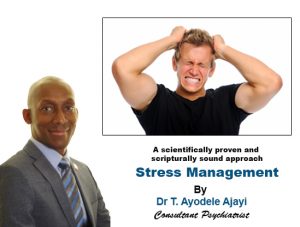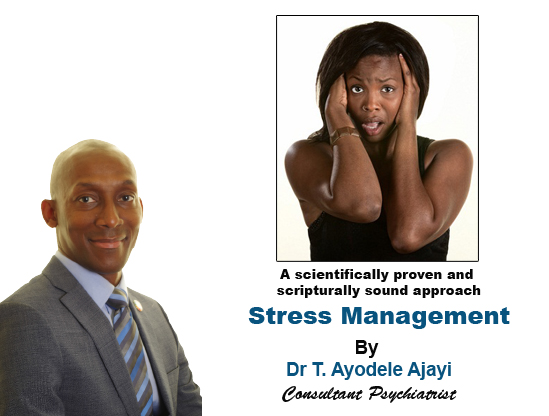Stress Management: A scientifically proven and scripturally sound approach
Unmitigated stress is a killer that has been linked directly or remotely to many physical and mental ailments that plague modern man. According to the Royal College of Psychiatrists, “stress is the way that our bodies and minds react when struggling to cope with the demands of everyday life, an important or distressing event, or a big change in our life. It includes feelings (emotions), physical symptoms and changes in how our bodies work”.
Stressors
Common stressors include family life pressures, relationships, career, work, ministry, finance, loss, including but not exclusive to bereavement and emigration. Every individual differs in vulnerability to a particular stressor; and proneness can be influenced by early experiences, exposure, and education. Also, stressors are not restricted to negative life events. Positive events such as marriage, becoming a parent, moving to university, getting a first or new job, promotions, and starting new projects or ministry can all create toxic stress.
Stress can be positive and preservative if it is short-lived. Chronic stress – a consistent sense of feeling pressured and overwhelmed over a long period of time – is toxic and damaging globally to the body, brain and mind. Chronic stress symptoms include aches, muscular tension, weakness, sleeping difficulties, change in appetite, and difficulty switching off. Health consequences include heart disease, notably heart attacks and hypertension, dementia, obesity, type II diabetes, arthritis, immune suppression, and increased risk of several cancers. The emotional and cognitive consequences of chronic stress include social withdrawal, muddled thinking, and mood disorders such as anxiety and depression. Increased use of alcohol and dependence on illicit, prescribed drugs and nicotine have all been linked to chronic stress. Other behavioural-related effects are addiction to the internet, food or gambling.
Chemistry of stress
The changes in our bodies occur when there is a perception of threat causing the brain to release “stress hormones”- Adrenaline, Noradrenaline and Cortisol. This is meant to prepare the body to fight or flee from the challenge in short-term but becomes damaging in the long run. The speeding of the heartbeat, shallow fast breathing, and shutting down of non-essential biological systems such as digestion all play a part in getting the body ready for action. Other symptoms include sweatiness of the palms and dry mouth.
Stress Management
Stress management can be summed up in an approach I coined the 5T strategy. So, in order to stay on top of stress, it entails managing your trust (faith and spiritual needs), thoughts, temple ( body), time, and treasures.
Manage Your Trust
Research shows that faith in a being beyond you has been established to support mental and physical well-being. On a personal note, my faith is in a God who is my heavenly father and cares about the finite details of my life. He is one I can trust to take care of what I am unable to handle. Gratitude – a mindset tuned to see things to be thankful for – has been associated with less stress and less toxic emotions. Meditation, as prescribed and alluded to in Joshua 1:8, Isaiah 26:3 and Philippians 4:8; has been linked to mental well-being. It slows brain aging and loss, releases Dopamine (a reward brain chemical) and Serotonin (mood balance chemical), and is also associated with improved sleep and decreased self-rumination.
Manage Your Thoughts
Reframing thoughts about stress is key to staying afloat. This could include limiting exposure to a stressor such as avoiding excessive consumption of negative news via the media if one is anxiety-prone. Re-assessing your coping abilities is another way to reframe your thinking. Re-appraisal of the stressor by asking “is this a threat or challenge?” is another cognitive approach to stress management.
 Manage Your Temple ( Body)
Manage Your Temple ( Body)
Maintaining a healthy diet that is balanced, high in fruits and vegetables, and low in caffeine and stimulants with good hydration is key to stress management. Getting adequate sleep and recreation is a pillar that is often overlooked these days. The thinking that cutting back on optimal sleep time enhances productivity is a mirage of the 21st century and it is not supported by research. Recreation to recharge the batteries is essential.
Manage Your Time
Overcommitment is a recipe for stress. Learning to say no, but graciously keeping a diary and a to-do list are pragmatic approaches. Time management is key to stress management. Periodically blocking out self-care time on a daily, weekly, monthly and quarterly slot is another way to combat stress.
Managing your treasures is about managing your relationships for optimal mental well-being. A quick win approach is to take a personality test yourself. www.16personalities.com offers a free and helpful one. Another great resource is www.stress.org.uk . Finally, I encourage you to seek professional help if you are struggling. Start with speaking with your GP.



